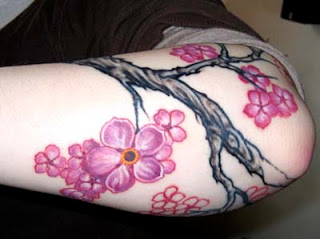 More often than not, when cherry blossoms appear in tattoo artwork, they do not appear alone. That sometimes seems a shame, for two reasons: their appearance and their meaning. The delicate and subtle beauty of these small blossoms is easily overwhelmed by the large and ornate Japanese sleeves, back-pieces, and body suits in which they typically float as backdrop elements . Even so, the centuries old Japanese tattoo tradition from which they spring, and where they are still firmly rooted, has essentially formalized their use in that way. But while their ability to stand alone as design elements may have been circumscribed by custom, their powerful symbolism has taken on a life of its own. As Motoori Norinaga, noted Japanese scholar of the 18th century, wrote in a poem, “If I were asked to define the spirit of Japan, I would call it the blossom of the mountain cherry, scattering its scent in the morning sun.” For the Japanese, the beautiful period of its flowering and then the all too soon fading and subsequent scattering of petals on the wind, symbolizes life itself – but not life in some abstract and distant sense.
More often than not, when cherry blossoms appear in tattoo artwork, they do not appear alone. That sometimes seems a shame, for two reasons: their appearance and their meaning. The delicate and subtle beauty of these small blossoms is easily overwhelmed by the large and ornate Japanese sleeves, back-pieces, and body suits in which they typically float as backdrop elements . Even so, the centuries old Japanese tattoo tradition from which they spring, and where they are still firmly rooted, has essentially formalized their use in that way. But while their ability to stand alone as design elements may have been circumscribed by custom, their powerful symbolism has taken on a life of its own. As Motoori Norinaga, noted Japanese scholar of the 18th century, wrote in a poem, “If I were asked to define the spirit of Japan, I would call it the blossom of the mountain cherry, scattering its scent in the morning sun.” For the Japanese, the beautiful period of its flowering and then the all too soon fading and subsequent scattering of petals on the wind, symbolizes life itself – but not life in some abstract and distant sense.The fragility of the cherry blossom is the fragility of human existence; its brief period of life, like our own; its implacable movement toward death, indifferent to the good things of this world, is the ideal death for a samurai warrior; and finally, its individual and perfect beauty is also ours. Poignant for some but hopeful for others, the symbolism of this staple in tattoo artwork seems almost more than a single flower could bear. However, like powerful tattoo symbols everywhere, it seems to shoulder the burden naturally.